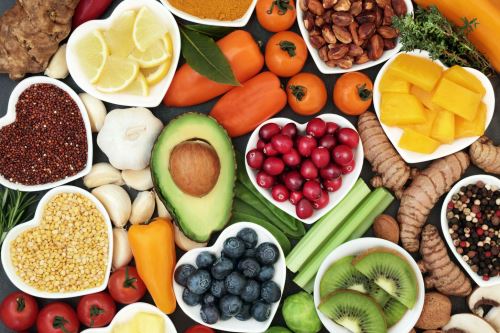The health of the arteries is intimately intertwined with the diet. Some food components are injurious to the arteries, while they’re beneficial foods for healthy arteries.
Injurious substances: Sodium, (primarily from table salt), saturated fat, and cholesterol, which is found only in animal-based foods.

Foods for healthy arteries: Antioxidants (found primarily in fruits and vegetables), soluble fiber (fruits, vegetables, and legumes), and unsaturated fatty acids (nuts, seeds, and vegetable oils).
Cholesterol is necessary within the body, and should not be considered a toxic substance in and of itself. The body is capable of producing sufficient cholesterol for its needs without recourse to consuming it from external sources.
Cholesterol is harmful only because it adheres to arterial walls causing arteriosclerosis. Above a certain level of blood cholesterol, there is an increased risk of arteriosclerosis and heart attack. Cholesterol is necessary, but insufficient by itself to cause arteriosclerosis. This disease results from the combination of several factors:
- Elevated blood cholesterol level.
- Lack of antioxidant substances, such as provitamin A, vitamins C and E, flavonoids, and other phytochemicals, due to a diet that is lacking in fruits, vegetables, whole grains, and nuts.
- Excess saturated fats because of a diet rich in milk, eggs, shellfish, meats, and meat derivatives.
- Lack of physical exercise, tobacco, stress, hormones, genetic makeup.
Therefore, it is not enough to be concerned with just achieving a certain cholesterol level. Some doctors prescribe drugs and recommended diets to lower cholesterol levels, but such half-measures are not enough to avoid arteriosclerosis and its complications. There are many cases of heart attack where cholesterol levels are normal.
There are two types of cholesterol in the blood depending on the lipoproteins that transport it:
- LDL or harmful cholesterol is combined with low-density lipoproteins and fosters arteriosclerosis.
- HDL or beneficial cholesterol is combined with high-density lipoproteins that protect against arteriosclerosis. Olive oil and physical exercise increase the levels of HDL cholesterol.
The expression “blood cholesterol level” refers to the total amount of cholesterol, the sum of both fractions.
To have healthy arteries and reduce the risk of arteriosclerosis and its complications (heart attack, stroke, poor circulation), it is necessary to:
- Reduce total cholesterol levels.
- Increase the level of antioxidants in the blood.
The above requisites are easily met with the fore mentioned foods for healthy arteries.
Related reading:
- Browse more Foods articles: https://naturalhealthmessage.com/nutrition/foods/
- Cardiovascular Health guides: https://naturalhealthmessage.com/conditions/cardiovascular-health/
- Supplements & reviews: https://naturalhealthmessage.com/supplements/
Foods For Healthy Arteries
AVOCADOS cannot be more highly recommended for cases of arteriosclerosis, hypertension, and coronary heart disease in general. They’re among the top artery cleansing foods. This is due, in addition to their interesting hypolipidemic (reduction of fat level in the blood) action, to the fact that they contain little sodium and abundant potassium.
BRAZILIAN GUAVA grows wild in tropical regions of America. The is used for jams and jellies. Brazilian guavas are great foods that clean arteries and veins, thanks to their significant amounts of B group vitamins.
The use of BUCKWHEAT is medicinally indicated in the following cases
- Circulatory disorders: hypertension (due to its very low sodium content), arteriosclerosis, and vascular fragility (tendency to hemorrhage and bruises on the skin).
CHICKPEAS contain no cholesterol. Therefore, eating more chickpeas and fewer meat products reduces cholesterol levels and improves arterial health. Finally, eating chickpeas prevents arteriosclerosis in all of its manifestations, including heart attack.
GRAPEFRUIT serves to protect arterial walls from the hardening and thickening associated with the deposit of cholesterol and its consequent calcification, the process known as arteriosclerosis. In this way, the grapefruit increases the volume of blood reaching the tissues and improves arterial circulation. Pectin is the non-nutritive component that is principally associated with this effect.

GUAVA is an excellent example of foods for healthy arteries. Its consumption prevents the risk factors that cause arteriosclerosis: hypertension and high cholesterol.
The PEAR’S capacity to lower blood pressure has been known since antiquity. This is attributed to its diuretic effect. Today it is known, as well, that the pear contains no sodium, a mineral that tends to retain water within the body, thus increasing blood pressure.
RYE makes the arterial walls more elastic, the blood more fluid, and it improves circulation. In reality, this prevention of arterial degeneration is a common feature of whole grains, although it seems that rye’s effect is more pronounced.
SQUASH is great for coronary affections and arteriosclerosis because of its minimal levels of fat and sodium, as well as by its abundance in beta-carotene (provitamin A), which protects the arteries’ walls, squash is recommended in the diet of all who wish to care of their arteries. Those suffering from coronary heart disease (angina pectoris or myocardial infarction) should not fail to eat squash at least three times a week.
STRAWBERRIES are an effective means of avoiding arteriosclerosis. Strawberries also contribute to arterial health by their lack of fat and sodium, and their richness in potassium, a mineral that prevents hypertension.
SUNFLOWER SEEDS and its essential fatty acids impede the progress of heart disease by lowering the level of cholesterol in the blood. Additionally, they foster Prostaglandin E1 production in the body, which is a physiology very important substance that provides the following benefits:
- Dilates the blood vessels.
- Reduces the risk of blood clots by reducing the stickiness of the platelets, which clump to form clots
Vitamin E, which sunflower seeds contain in abundance, is a powerful antioxidant that prevents arterial deterioration. It also reduces platelet stickiness, which helps prevent blood clots and heart attacks.
YAMS contain a steroid that stops the peroxidation of blood lipids (the principal cause of arteriosclerosis) and lowers the level of triglycerides, which are a type of fat in the blood. All of this, together with their low-fat content and their richness in potassium, makes yams very appropriate for cardiovascular disorders, particularly arteriosclerosis.
Health Disclaimer: The information on this website is for educational uses only and is not a substitute for professional medical advice. Always consult an authorized healthcare provider for any health concerns before using any herbal or natural remedy. We do not establish, treat, cure, or prevent any disease. Reliance on any material from this website is solely at your own risk. We are not responsible for any adverse effects resulting from the use of information or products mentioned on this website.
REFERENCES
- George D. Pamplona-Roger, M.D. “Encyclopedia of Foods and Their Healing Power.” George D. Pamplona-Roger, M.D. Encyclopedia of Foods and Their Healing Power. Trans. Annette Melgosa. Vol. 2. Chai Wan: Editorial Safeliz, 2005. 82, 83, 110, 115, 102, 92, 94, 95, 115, 113, 117, 98, 104, 106, 107, 101. [foods for healthy arteries]
